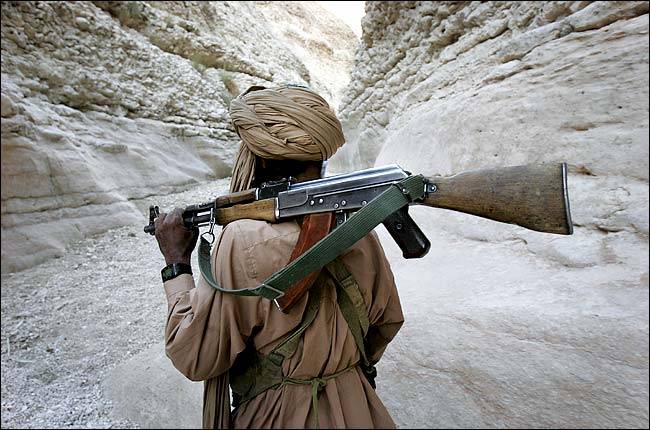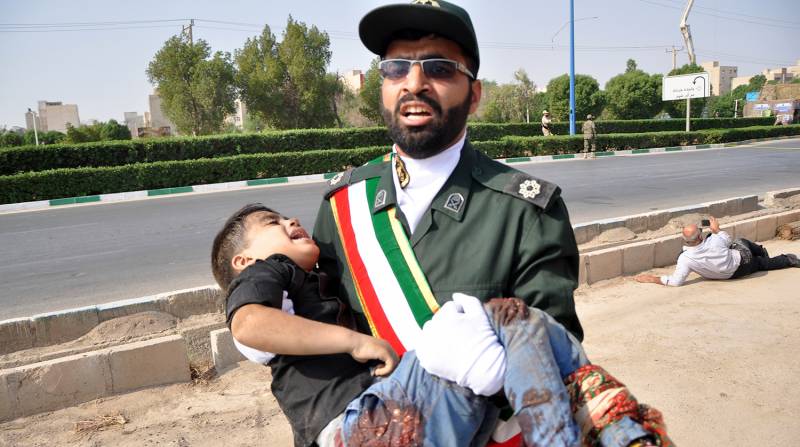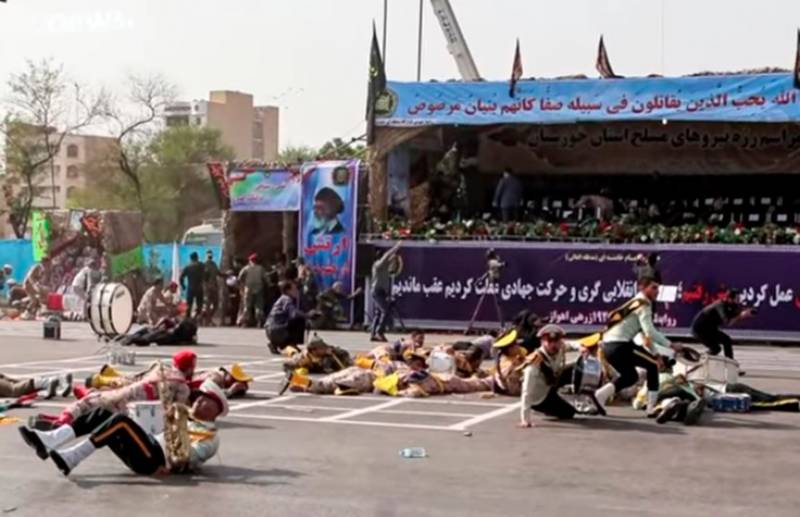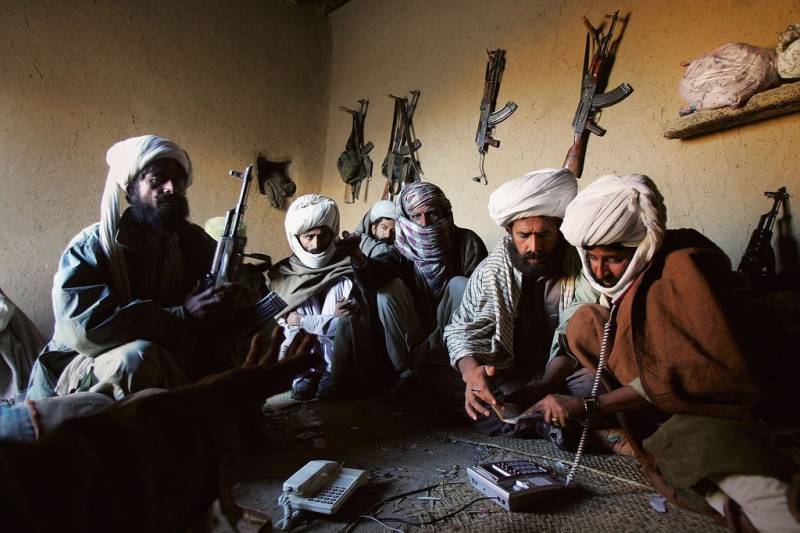Who actually committed the attack in Ahwaz?
Recall last Saturday, September 22 2018, a group of unidentified armed militants dressed in camouflage unmarked, rode motorcycles to the site of the military parade in the southern Iranian city of Ahvaz and opened fire.
The main goal was probably the VIP-tribune, where there was a group of high-ranking Iranian military and numerous representatives of local civil authorities and Shiite clergy. In all, 29 was killed and 62 people were injured, including members of the Islamic Revolutionary Guard Corps and the local Basij militia, as a result of the attack. All the attackers were eliminated.
According to statements by various news agencies, two terrorist groups have assumed responsibility for what happened: the well-known Islamic State of Iraq, Syria and the Levant (forbidden in the Russian Federation) and the little-known Arab Patriotic Movement for the Liberation of Ahvaz.
Both groups are radical Sunni and have long opposed Iran’s Shiites, considering them to be “heretics”. If we talk about the “Islamic State”, we note that, on the one hand, this organization, being one of the world's largest groups of transnational jihadists, has been extremely active in recent years, and therefore the version with its participation seems quite real.
The fact that IG militants could have committed an attack during a military parade in Ahvaz also shows that they really hate the Shiite regime of Iranian ayatollahs, and last year they (or groups affiliated with them) managed to carry out a very resonant terrorist attack in Tehran itself.
However, on the other hand, there were several cases when the leaders of this group took responsibility for the terrorist acts that they (as is reliably known) did not, guided, probably, solely by “HYIP” considerations in the information space and by the desire to increase their importance against other similar groups. Therefore, it can be assumed that in the event of an attack in Ahvaz, the leaders of the IG are once again trying to appropriate someone else's "glory."
Moreover, in confirmation of the version of non-participation in the Akhvaz terrorist attack, militants from this group of ultra-radical caliphists say that in recent years this terrorist organization suffered huge losses in Iraq and Syria, and, figuratively speaking, its remaining militants have enough cases in the “bloody belt” from the north of Iraq to the south of Lebanon.
Although it is possible to assume a completely different version of events: precisely because of their defeat in the above region, and probably not seeing any particular prospects in the fight against "Christian Crusaders" (to which they rank both the United States and NATO, and Russia), the leaders of IG »Shifted the focus of their activities to" Shiite heretics ".
And the attack in the Iranian capital last year also fits well with this scheme. Indeed, it can be assumed that against the background of the defeats suffered by the Islamic State in Iraq and Syria, the attack on the parade in Ahvaz is an attempt to demonstrate the still vitality and supposedly still great military potential of this terrorist group.
Moreover, we note separately that the fact that until that time the militants of “IG”, who are ultra-radical Sunnis, did not make attacks against the Islamic Shiite republic, does not testify in favor of the highest qualification of the Iranian secret services. Until that time, the Ayatollah regime and the IG, which emerged at the stage of the formation of the Sunni caliphate, mutually pretended that they did not notice the existence of each other, although they were their worst enemies.
In general, the relationship between Iran and IG for many years resembled the relationship between Iran and Al-Qaida (banned in the Russian Federation), another probable claimant to commit such an attack, when everyone fought with his enemy, and in some aspects (for example, hatred of the United States) between these forces was even concluded something like an informal truce for joint action.
Many experts point out that the Iranian leadership had, and probably still has, a very specific relationship with al-Qaeda. In particular, although the Iranians handed over to the Americans individual members of this terrorist organization (who fled to this Islamic republic after the beginning of the American invasion of Afghanistan), but according to some sources, Tehran partially supported Al-Qaeda there and even helped to transfer its militants to Iraq.

However, there is no reason to believe that the remaining al-Qaeda militants suddenly decided to make an attack at Ahvaz with something. Another thing is the "Islamic state". The fact is that the Iranian leadership failed to establish the same “cordial” relations as with Al-Qaeda. At best, between Iran and IG was something like a fragile reciprocal “non-interference”, but this condition was broken (it is not clear on whose initiative) last year when the Caliphists attacked in Tehran.
Moreover, unlike Al-Qaida, the Islamic State was probably able to create in Iran’s territory, relying on various ethnic and religious minorities, a network of “sleeping cells”, and in recent years it has been periodically used to engage them in terrorist actions within this Islamic Republic. Therefore, it is absolutely impossible to exclude the fact that behind the attack in Ahvaz the leaders of the “IS” stand, it is impossible.
Another contender for the "authorship" of the recent attack in Iran is the relatively small and not very well-known grouping of the "Arab patriotic movement in the struggle for the liberation of Ahvaz." This organization, not so “authoritative” as “IG”, in the circles of international Islamists, was created not so long ago on the initiative and with the support of the “Ministry of Jihad” and military intelligence of Saudi Arabia.
This grouping is an attempt by Riyadh to gain leverage over Tehran by inciting separatism in the Iranian province of Khuzestan. However, according to a number of specialists, the influence of Saudi Arabia in this region is based on the aura of its ruling dynasty as “guardians of two sacred (for Muslims) cities” of Sunni Islam and supported by its enormous financial resources. And its creature here is more political than terrorist-sabotage movement.
Although, if we recall the diversified support by Iran in recent years of the Yemeni Shiite rebels in the south of the Arabian Peninsula, then we can’t exclude a transition from Khuzistani separatists to terrorist actions on the initiative of Riyadh.
True, the leaders of ASMLA currently live mainly in European cities, and not at all distressed, with Saudi money, and clearly prefer more loud anti-Iranian statements than the preparation and conduct of sabotage in Iran. According to a number of experts, their fighting wing, the Mokheddin Nasser Martyrs Brigade, almost ceased its activities, and the former odious leader of this movement was shot dead in the Netherlands last fall.
Also, do not forget that the vast and sparsely populated territories of southeastern Iran at the junction with the borders of Afghanistan and Pakistan are the territory called Greater Balochistan (Baluchistan). In this region, the majority of the population are Sunni, with centuries-old traditions of separatism and adherence to the ideology of "struggle against the power of the Persians." In these areas, the IG (in parallel with the Saudi and Pakistani intelligence services, strongly supporting local separatists) also took very deep roots: most of the small Islamist groups "swore allegiance" to ultraradical caliphists.
In general, the regions of Baluchistan and Seistan, the poorest and economically most backward of the Iranian provinces, are a long-standing big problem for the Ayatollah regime. Actually, the main problem there lies in the local tribes (Baluchi and others), which are called “Iranian Afghans” and “Kurds of the Middle East” because of their militancy, intertribal division, adherence to clan organization of society, particular fanatical religiosity, in general, from - for all that was one of the factors of local communities' commitment to the ideas of "IG".
And here we turn to the fourth terrorist group, which could have launched an attack in Ahvaz, known in the wrong Russian transcription as “Jundallah” (“Army of Allah”). In our opinion, it is this organization (or more modern counterparts derived from it) that has the greatest chances of “authorship” of the above-mentioned terrorist act that took place on 22.09.2018.
First, the Jundalla is marked by a high degree of intransigence against Shiite authorities, has a wide and branched structure throughout southeastern and southern Iran and is also distinguished by its cruelty.
Secondly, earlier the militants of the “Troops of Allah” had repeatedly committed acts of terrorism and sabotage, directed mainly against the Iranian security officials (just like at the parade in Ahvaz). Thus, a series of explosions that occurred in Pishkin in 2009 were widely known, due to which negotiations between the Shiite leadership and the Baluchi Sunni leaders were thwarted (more than 50 people were killed as a result of these attacks, including 2 of the “KSIR” General) .
Despite the fact that after this, the Iranian secret services declared an all-out war against the “Troops of Allah” and later pompously declared the destruction of this organization, it is likely that this group was not completely eliminated, and in recent years it has been revived (most likely, not without assistance of Saudi Arabia or Pakistan, and, perhaps, not without the sanction and not without the support of someone more distant, located overseas), the result of which was the terrorist attack in Ahwaz.



Information